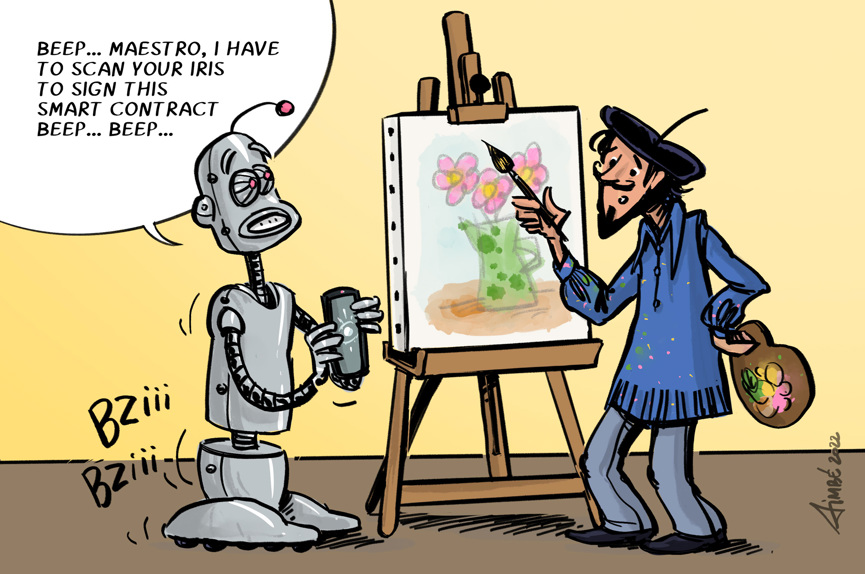- Commercial and Economic Law
- smart contract , digitised contract , self-executing contract , code rules , decentralised blockchain network , blockchain , automatically executed , decentralised finance , source code , Letter of Intent , LOI
The digitalisation of our society translates into various parts of it. Also the legal world cannot escape from it and evolves along with the constantly growing technology and innovation. As a result, more and more contracts are being digitised - these contracts are known as "smart contracts".
In this article, we explain what a smart contract is and how such a contract works. We also explain the advantages and dangers of such a contract.

1. What are smart contracts?
A smart contract links the mathematical power and applications of IT systems to the execution of commitments and arrangements between parties. Based on this, the contract is automatically executed according to the rules predetermined by the parties.
A smart contract can thus be regarded as a kind of 'self-executing' contract in which the terms of the agreement between the various (possibly anonymous) parties are directly written or translated into code rules.
These code rules and the terms of the agreement contained therein are recorded in a distributed and decentralised blockchain network. A blockchain should be seen as a kind of database in which the transactions (and their rules) are stored so that they are accessible to everyone and can be checked. This source code in turn controls the execution of the agreement and the transactions taking place. In this way, the consequences for the parties are traceable, transparent and irreversible.
Smart contracts thus make trusted transactions and agreements possible between anonymous parties without the need for a reliable central authority, intermediary, legal system or external enforcement mechanism.
2. Why should one create a smart contract?
Since smart contracts are automatically executed as soon as they are concluded, there is no need to verify or enforce agreements between parties.
The purpose of smart contracts is to provide a better digital security for traditional contracts. Smart contracts also provide for a 'faster' and potentially simpler way of contracting.
Precisely because of the automatic system by which a smart contract executes itself according to the set rules, the contract itself ensures that it is complied with as soon as a number of criteria are met.
In the coming years, smart contracts will undoubtedly take off in a big way because of the numerous advantages associated with them, certainly in the area of simpler, more straightforward agreements. This can already be seen in the development of "decentralised finance", for example, which makes financial transactions and agreements possible without the intervention of a third party, such as a bank. It is therefore crucial to keep abreast of these developments.
3. Consequences and dangers of smart contracts
Despite the many advantages of smart contracts, we must not remain blind to their dangers.
The complex structure behind the smart contracts ensures that such contracts are not accessible to everyone.
One should not forget that smart contracts have many legal implications. Indeed, one of the cornerstones for a valid contract is the consent of the parties to a contract. In the case of smart contracts, the informed consent can be disputed due to the opacity of the source code.
As previously pointed out in this article, the procedure in smart contracts and the verification of compliance with the terms of the contract are automated. This automation is accompanied by a lack of evidential value. After all, there is no written proof of the agreed rights and obligations of the parties because these are formulated in code rules. Also, the verification of the way in which the rules have been formulated and will be applied often requires extensive technological and IT knowledge.
It is therefore not a bad idea to engage a lawyer to draft a Letter of Intent (LOI). He is able to translate the digital, mathematical code language into a practical guideline that reflects the wishes of the parties.
4. Conclusion
Although the digitalisation of our society brings us many benefits and new ideas and insights, we must not lose sight of the other side of the coin.
Blockchain technology and the smart contracts based on it allow parties who do not know each other to enter into transactions without an intermediary. But this is offset by the deep underlying technological complexity that few can control and manage in depth, and how it must be integrated into the existing legal systems. The technology is still in its infancy and there is no clear legal framework yet.
It will therefore be important to follow these evolutions closely and to fit them into the existing structures, with the necessary protection and transparency towards the users. Seeds of Law can play a role in this.
Should you like more information about entering into such smart contracts or should you like to be assisted, please do not hesitate to contact our specialists via info@seeds.law or +32 (0)2 747 40 07.



